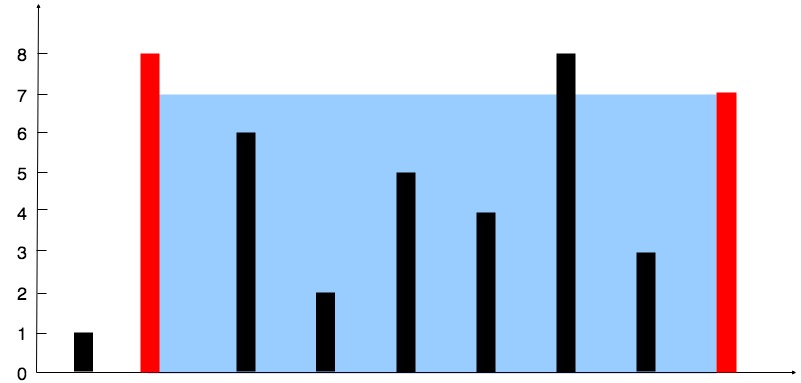原文链接: https://leetcode-cn.com/problems/container-with-most-water
英文原文
Given n non-negative integers a1, a2, ..., an , where each represents a point at coordinate (i, ai). n vertical lines are drawn such that the two endpoints of the line i is at (i, ai) and (i, 0). Find two lines, which, together with the x-axis forms a container, such that the container contains the most water.
Notice that you may not slant the container.
Example 1:

Input: height = [1,8,6,2,5,4,8,3,7] Output: 49 Explanation: The above vertical lines are represented by array [1,8,6,2,5,4,8,3,7]. In this case, the max area of water (blue section) the container can contain is 49.
Example 2:
Input: height = [1,1] Output: 1
Example 3:
Input: height = [4,3,2,1,4] Output: 16
Example 4:
Input: height = [1,2,1] Output: 2
Constraints:
n == height.length2 <= n <= 1050 <= height[i] <= 104
中文题目
给你 n 个非负整数 a1,a2,...,an,每个数代表坐标中的一个点 (i, ai) 。在坐标内画 n 条垂直线,垂直线 i 的两个端点分别为 (i, ai) 和 (i, 0) 。找出其中的两条线,使得它们与 x 轴共同构成的容器可以容纳最多的水。
说明:你不能倾斜容器。
示例 1:

输入:[1,8,6,2,5,4,8,3,7] 输出:49 解释:图中垂直线代表输入数组 [1,8,6,2,5,4,8,3,7]。在此情况下,容器能够容纳水(表示为蓝色部分)的最大值为 49。
示例 2:
输入:height = [1,1] 输出:1
示例 3:
输入:height = [4,3,2,1,4] 输出:16
示例 4:
输入:height = [1,2,1] 输出:2
提示:
n == height.length2 <= n <= 1050 <= height[i] <= 104
通过代码
高赞题解
设两指针 $i$ , $j$ ,指向的水槽板高度分别为 $h[i]$ , $h[j]$ ,此状态下水槽面积为 $S(i, j)$ 。由于可容纳水的高度由两板中的 短板 决定,因此可得如下 面积公式 :
$$
S(i, j) = min(h[i], h[j]) × (j - i)
$$
 {:width=500}
{:width=500}
在每个状态下,无论长板或短板向中间收窄一格,都会导致水槽 底边宽度 $-1$ 变短:
若向内 移动短板 ,水槽的短板 $min(h[i], h[j])$ 可能变大,因此下个水槽的面积 可能增大 。
若向内 移动长板 ,水槽的短板 $min(h[i], h[j])$ 不变或变小,因此下个水槽的面积 一定变小 。
因此,初始化双指针分列水槽左右两端,循环每轮将短板向内移动一格,并更新面积最大值,直到两指针相遇时跳出;即可获得最大面积。
算法流程:
初始化: 双指针 $i$ , $j$ 分列水槽左右两端;
循环收窄: 直至双指针相遇时跳出;
更新面积最大值 $res$ ;
选定两板高度中的短板,向中间收窄一格;
返回值: 返回面积最大值 $res$ 即可;
正确性证明:
若暴力枚举,水槽两板围成面积 $S(i, j)$ 的状态总数为 $C(n, 2)$ 。
假设状态 $S(i, j)$ 下 $h[i] < h[j]$ ,在向内移动短板至 $S(i + 1, j)$ ,则相当于消去了 ${S(i, j - 1), S(i, j - 2), … , S(i, i + 1)}$ 状态集合。而所有消去状态的面积一定都小于当前面积(即 $< S(i, j)$),因为这些状态:
短板高度:相比 $S(i, j)$ 相同或更短(即 $\leq h[i]$ );
底边宽度:相比 $S(i, j)$ 更短;
因此,每轮向内移动短板,所有消去的状态都 不会导致面积最大值丢失 ,证毕。
< ,
, ,
, ,
, ,
, ,
, ,
, ,
, >
>
复杂度分析:
时间复杂度 $O(N)$ : 双指针遍历一次底边宽度 $N$ 。
空间复杂度 $O(1)$ : 变量 $i$ , $j$ , $res$ 使用常数额外空间。
代码:
[]class Solution: def maxArea(self, height: List[int]) -> int: i, j, res = 0, len(height) - 1, 0 while i < j: if height[i] < height[j]: res = max(res, height[i] * (j - i)) i += 1 else: res = max(res, height[j] * (j - i)) j -= 1 return res
[]class Solution { public int maxArea(int[] height) { int i = 0, j = height.length - 1, res = 0; while(i < j) { res = height[i] < height[j] ? Math.max(res, (j - i) * height[i++]): Math.max(res, (j - i) * height[j--]); } return res; } }
[]class Solution { public: int maxArea(vector<int>& height) { int i = 0, j = height.size() - 1, res = 0; while(i < j) { res = height[i] < height[j] ? max(res, (j - i) * height[i++]): max(res, (j - i) * height[j--]); } return res; } };
统计信息
| 通过次数 | 提交次数 | AC比率 |
|---|---|---|
| 580236 | 930683 | 62.3% |
提交历史
| 提交时间 | 提交结果 | 执行时间 | 内存消耗 | 语言 |
|---|
相似题目
| 题目 | 难度 |
|---|---|
| 接雨水 | 困难 |




